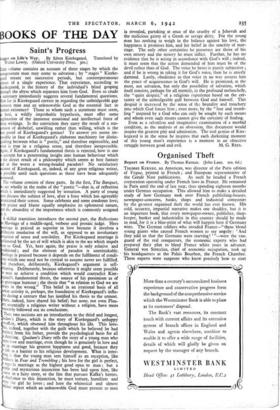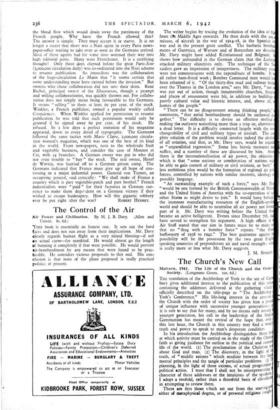Organised Theft
Report on France. By Thomas Kerman. (John Lane. to& 6d.) THOMAS KERNAN, an American, was director of the Paris edition of Vogue, printed in French ; and European representative of the Conde Nast publications. As such he headed a French corporation operating under French laws in France. He remained in Paris until the end of last year, thus spending eighteen months under German occupation. This allowed him to make a detailed study of how Germany took over French publishing-houses, newspaper-concerns, banks, shops and industrial companies by the greatest organised theft the world has ever known. His cold, accurate, impartial narrative makes one shudder, but it is an important book, that every newspaper-owner, publisher, shop- keeper, banker and industrialist in this country should be made to read, for it is a blue-print of what will happen here if Germany wins. The German soldiers who invaded France—" those blond young giants who caused French women to say angrily : ' And they told us that the Germans were starving! ' "—were the van- guard of the real conquerors, the economic experts who had prepared their plan to bleed France white years in advance. General von Streccius, chief of economic occupation, took up his headquarters at the Palais Bourbon, the French Chamber. These experts were surgeons who knew precisely how to start the blood flow which would drain away the patrimony of the French people. Why have the French allowed this? The answer is simple. They must accept it or starve. It is no longer a secret that there was a Nazi agent in every Paris news- paper-office waiting to take over as soon as the Germans arrived. Most of these agents had for some time wormed their way into high editorial posts. Many were Frenchmen. It is a terrifying thought! Only three days elapsed before the great Paris-Soir (3,000,000 circulation daily) was co-ordinated into the Nazi scheme to resume publication. So immediate was the collaboration of the huge-circulation Le Matin that " it seems certain that some understanding must have existed before the invasion." But owners who chose collaboration did not save their skins. Rene Bachet, principal owner of the Illustration, though a prompt and willing collaborationist, was quickly thrown out. For collabo- ration does not simply mean being favourable to the Germans. It means " selling " to them at least 6o per cent. of the stock. Winkler, a French publisher, owned a popular weekly called Confidences. When Winkler applied for permission to resume publication he was told that such permission would only be granted if he signed away 6o per cent. of his stock. He refused. In a few days a perfect imitation of his magazine appeared, down to every detail of typography. The Germans followed the same tactics with Marie Claire, 2,000,000 circula- tion women's magazine, which was one of the best of its kind in the world. From newspapers, turn to the wholesale fruit and vegetable business, and consider the case of Monnot et Cie, with 54 branches. A German owner was put in who did not even trouble to " buy " the stock. The real owner, Henri de Wavrin, was hurried off to a German prison camp. The Germans indicated that France must give up all hope of con- tinuing as a major industrial power. General von Turner, an occupying general, said cynically : " We shall make of France a country which is Tian vegetable-patch and part brothel." French industrialists were " paid " for their factories in German cur- rency to make them dependent on a German victory if they wished to escape bankruptcy. How will this gigantic robbery
ever be put right after the war? ROBERT HENREY.



























 Previous page
Previous page